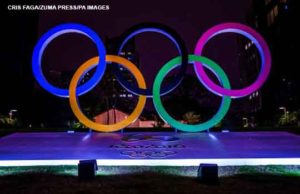 I had my first shift at the Olympic Stadium last night and it was my first opportunity to meet my colleagues. The medical service at the stadium is integrated, unlike the arrangements at the 2012 games in London. Nurses roam the stands and are on hand for any medical problems in the crowd, and the Field of Play team are out in the park, backing up the team medics. These teams all radiate from our base, are briefed for their shift as a group, and keep in touch by radio. The base is a suite of rooms immediately inside one of the corner access ramps, that goes right through the ground floor of the stadium. It’s air conditioned, thank goodness. And if need be, our own designated ambulances are parked outside so that they could drive right through on to the pitch if that were needed. But hopefully they won’t be, touch wood.
I had my first shift at the Olympic Stadium last night and it was my first opportunity to meet my colleagues. The medical service at the stadium is integrated, unlike the arrangements at the 2012 games in London. Nurses roam the stands and are on hand for any medical problems in the crowd, and the Field of Play team are out in the park, backing up the team medics. These teams all radiate from our base, are briefed for their shift as a group, and keep in touch by radio. The base is a suite of rooms immediately inside one of the corner access ramps, that goes right through the ground floor of the stadium. It’s air conditioned, thank goodness. And if need be, our own designated ambulances are parked outside so that they could drive right through on to the pitch if that were needed. But hopefully they won’t be, touch wood.
The team is made up of a mixture of nurses, some senior medical students in the crowd, and doctors at the base, who also form the Field of Play team (the FOP). They are ready to provide emergency care and have the enormous privilege of having seats on the edge of the pitch far in front of the front seats, within touching distance of the athletes. Not everyone can be out there at once, there must be some in the base to receive any casualties from the crowd, so we rotate. Last night we had women’s football, and a packed house who have come to see Brazil beat Sweden—which they did, 5:1.
It’s not surprising that despite several players rolling on the ground clutching their knees or ankles there is no demand for our spinal boards and resuscitation kit. But back at the base, a constant stream of people with minor complaints are treated. They are either referred or brought in, sometimes in a wheelchair, by the crowd nurses. Some are from the stadium staff, from the “hotel services” side, and some spectators, although the nurses bring back many more written reports of people they have treated, who would not leave the stands for fear of missing a moment of play. The issues are all minor, such as grazes from falling on the grandstand steps or feeling ill from the heat—it has been very hot, 30℃, all day. There are very few, almost none, of the “alcohol related” illness that beseige UK emergency rooms.
My colleagues at the base are Brazilian—of course—Argentinian, and American. There is one other British doctor. I’m the only anaesthetist, the rest are A&E/ER doctors and orthopedic surgeons, with sports medicine interests. We also have physiotherapists at the base, who help care for casualties, and if needs be for athletes from small countries and teams that have limited back-up support, but as the stadium is staging football, at present they have little to do there.
Language is a problem. I’ve learnt enough for polite introductions, but however much “Good evening, how are you?” works well when making friends, it’s a bit inadequate when the patient has a twisted ankle. My medical colleagues all speak good English, and seem grateful to have an airway specialist aboard, so I’ll stay in that role and not aspire to full critical care lead, which they are highly capable of providing. In any case, despite providing full details of my qualifications and registration, only Brazilian doctors may prescribe. Nurses speak less English, but in a resuscitation event, I am confident that the universal procedures will be understood.
Drugs themselves are less universal, so perhaps that prescription rule is sensible. Brazilian practice includes some different drugs to the UK, and some with different names. Some names are similar, but with worryingly different spelling, some need resort to a pharmacopoeia to know what they are. An American colleague and I spent our first evening on shift labelling drug boxes with their European/US names, their purpose, and function. I’ve also assembled and tested our brand new ventilators, laid out an incubation tray, also all brand new kit, and everything else I can think off in case the worst should happen.
“Thinking black” has to be good practice in this situation, but the “glory of the games” prevents any depression. The uplift that a stadium full of people cheering gives, still works even if they are chewing for countries not your own. And some of the football has been wonderful, even to this football-phobe! If you didn’t see the fourth goal, scored by team captain Marta (Vieira da Silva, but to all, “Marta”) it was a miraculous piece of footwork!
John Davies is a consultant anaesthetist in Lancaster, who takes part in motorsport as a competitor and as a rally doctor.
Competing interests: I have read and understood BMJ policy on declaration of interests and I have no financial or other competing interest in the Olympic Games.
